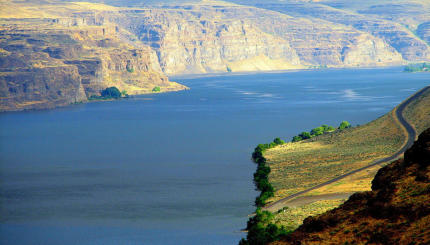
Every year, I laugh out loud at this week’s Torah reading, the crossing of the Red Sea.
There Moses stands, so close to his goal of guiding the Israelites out of slavery, when suddenly everything goes wrong. A body of water blocks the group’s path forward. An advancing army blocks them from behind. The people begin to melt down, yelling that they prefer slavery to death.
What does Moses do? He says, “Shut up everyone, God is going to save you.”
God, however, has a different idea. “What are you calling on me for?” God asks Moses. “You’re the leader! Speak to the people and tell them to go forward! Lift up your magic staff, point it at the sea, and divide it!”
Moses raises his staff, God whips up an east wind, the sea parts and the Israelites cross. And Moses becomes such an enthusiastic leader that his father-in-law has to teach him to delegate.
Some Hassidic Biblical commentators say the moment transforms everyone. At the Red Sea, the Israelites share a profound mystical experience, uniting them into a nation.
It’s a funny interpretation, however, as the Torah itself suggests they had many different experiences. Multiple descriptions of the crossing of the Red Sea sit side by side in the text. God blows a puff of wind through the Divine nostrils. God fights for the people. Moses redirects the water with his magic wand. Moses reasons with the people, and they move forward, displacing the water. Windy weather, a happy coincidence, works in their favour.
Some Israelites see a miracle; some see human psychology at work; some see basic science. They aren’t having a shared mystical experience at all. In fact, they are all over the place in their faith and their experience of God. And yet somehow, without that spiritual unity, they move forward to save themselves and each other. A delightful message.
This year, however, I am not laughing.
Our whole world, one might say, is standing at the shores of the Red Sea. As anger over economic inequality erupts through dangerous religious conflicts, we cannot see a safe way forwards. The prophet Zechariah might have promised a day when God would harmonize all religious conflicts, but such a day seems far off. Instead of laughing, I am frowning, anxious and metaphorically paralyzed.
Then I remember the Torah’s teaching about the psychological reality of standing at the sea. Moses is unskilled. The Israelites agree on little. Yet, Moses takes leadership and the people move forward. They do not permanently abolish injustice or change Pharaoh’s mind, but they do move forward.
How do we move forward in a world torn by religious differences? Following author Stephen Prothero, we first recognize that the differences are real. Religious traditions ask different questions, and create cultural practices around the answers. Jews ask, “How can we heal broken human communities?” Christians ask, “How can we forgive and be forgiven?” Muslims ask, “How can we be aware of God in every moment?” Hindus ask, “How can we see through illusions of materialism and egotism?” Buddhists as, “How can we learn to minimize suffering?” Indigenous traditions ask, “How can we live in awe of the land that sustains us?”
Of course these are inexact generalizations, based in spiritual teachings that become distorted through political manipulations. Still, they are challenging questions, interrogating our own and each other’s cultural practices. For example, Christian-based cultures may heal rifts through forgiveness, but how do they respect the land? Jewish culture may successfully create a transnational community, but how do we see through illusions of materialism? Muslim cultures may excel at spiritual awareness, but how do they reduce suffering?
These questions, left unanswered, erupt in bursts of violence. We must ask them of ourselves and each other In our more rational, peaceful moments. And by “we,” I mean all of us.
Few of us are presidents, prime ministers, kings or queens, but all of us have spheres of influence. All of us can reach out across difference and allow ourselves to be challenged. If we don’t who will?
Because, as God says, “You’re the leader!”
Adapted from my sermon at Cloverdale United Church, for Vancouver School of Theology‘s “Theology Sunday” January 25, 2014.
Torah
Pronunced: TORE-uh, Origin: Hebrew, the Five Books of Moses.


